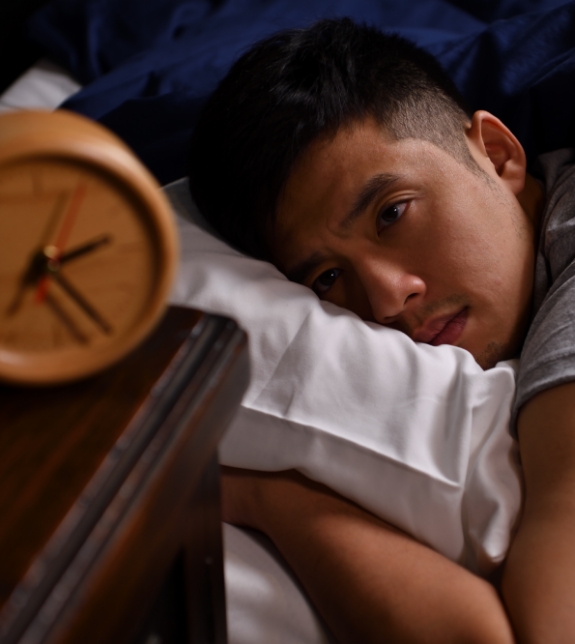Insomnia
Introduction to Insomnia
Although we spend roughly one third of our lives asleep, many people struggle to get a good night’s sleep.
When this happens regularly, it is a condition known as insomnia. Insomnia is a serious condition because it can have a significant negative impact on a person’s physical and mental health.
Definition of Insomnia
Insomnia happens when a person experiences difficulty falling asleep, staying asleep or waking up earlier than desired.
The difficulty with sleep happens even when a person has an adequate opportunity to sleep i.e. a comfortable quiet dark room. As a result of not getting enough sleep, the person experiences a range of daytime symptoms, which are collectively known as daytime functional impairment
People with insomnia experience sleep disturbance and daytime symptoms at least 3 times per week.
Insomnia can be classified into 2 main types:
• chronic (more than 3 consecutive months)
• short term (intermittent, and less than 3 consecutive months)

Previous definitions of insomnia
Insomnia was previously categorised into primary insomnia, which could not be explained by another cause, and secondary insomnia which was caused by another medical, mental health or sleep condition.
Is insomnia more likely to happen in certain people?
Insomnia is more common in women, particularly around the time of the menopause and in older adults.
How common is insomnia?
It is estimated that 10% of the population
have chronic insomnia disorder. The prevalence of short-term insomnia is much higher, up to 30% of the population.
Understanding insomnia: Causes, impact, and treatment options
Esteemed, London-based consultant sleep physician and psychiatrist, Dr Dipesh Mistry explains all about insomnia, including the leading causes, what impact it can have on your health, and how it can be treated and managed.
Insomnia doesn’t just affect us at night, it has daytime consequences which makes it a 24-hour problem
Why do people develop Insomnia?
For many people, insomnia occurs with no clearly identifiable trigger and this can add to the frustration associated with insomnia.
What can cause insomnia?
Major and stressful life events
Noisy bedroom environment
Regular disturbance from a bed partner e.g. snoring
Poor sleep hygiene
Substances such as alcohol, caffeine and nicotine
Other sleep conditions
Mental health conditions
Having a “busy mind” at night
Physical health conditions, including chronic pain
Another sleep condition such as obstructive sleep apnoea, or restless leg syndrome
Medications
What are the symptoms of Insomnia?

Low mood

Regularly feeling drained

Less enthusiasm for hobbies

Disruption to social and personal life

Irritability

Slowed reaction times

Struggling with concentration and attention

Impaired short-term memory

Increased stress and anxiety, especially about sleep

Reduced motivation

Brain fog

Fatigue

Yawning
What are the health consequences of Insomnia?
Insomnia has a range of consequences for your mental health.
Insomnia can:
- Double the risk of developing anxiety
- Cause a fourfold increased risk of developing depression
- Trigger relapses in bipolar affective disorder
- Increase the risk of suicidal thoughts and attempts at suicide
- Worsen the impact and outcomes of other mental health conditions such as PTSD and personality disorders.

Insomnia can last for years if it is untreated
Are there any other consequences of Insomnia?
Insomnia is also linked to increased rates of absenteeism from work.
Insomnia can result in reduced performance and productivity in the workplace.
Click on the map below for the direct and indirect consequences of insomnia in terms of estimated annual economic losses in various countries

$50 billion in the UK (1.86% GDP)
$60 billion in Germany (1.56% GDP)
$21.4 billion in Canada (1.35% GDP)
$411 billion in the USA (2.28% GDP)
$138 billion in Japan (2.92% GDP)
How can I confirm whether or not I have Insomnia?
There is no specific test to directly confirm a diagnosis of insomnia. Insomnia can be diagnosed by a healthcare provider who is experienced in the assessment and treatment of sleep disorders.
Insomnia is only one of more than 70 sleep-wake disorders
What are my treatment options if I have been diagnosed with Insomnia?
Lifestyle changes
CBTi
Hypnotic or sedating
medications
Can I cure my insomnia
Can I cure my insomnia?
Many patients respond to Cognitive Behavioural Therapy for insomnia (CBTi).
It is important to screen for and address any mental or physical health conditions that might be causing or exacerbating the insomnia.
What about sleep hygiene
Can I cure my insomnia by practicing good sleep hygiene?
Poor sleep hygiene can lead to the development of insomnia. Poor sleep hygiene can also worsen insomnia, and make it difficult to recover from insomnia.
If your sleep has deteriorated to the point where you have developed insomnia, sleep hygiene alone may not be enough to reverse your insomnia.
What are the risks of not treating my insomnia
What are the risks of not treating my insomnia?
Untreated insomnia can have a significant and negative effect on the quality of your life.








